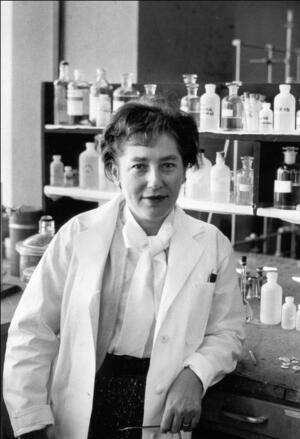Mildred Cohn
Mildred Cohn's scientific career could perhaps be described as a series of silver linings. She displayed a tremendous intellectual talent in her early years—having completed her undergraduate degree in chemistry at Hunter College (then a women's school) before the age of 18, designing a model of a combustion engine by 21, and obtaining a PhD under legendary chemist and Nobel laureate Harold Urey by 24—that today would make her the pick of the scientific litter. However, back in Cohn's day even her own PhD advisor could not help her find a suitable job, for in the era of pre-"equal opportunity" employment, Cohn had two strikes going against her—being a woman and Jewish—that no amount of talent could seem to overcome.
… Together, those silver linings made Cohn one of the leaders in applying physical chemistry to tackle biological questions. …
While the distinction of being a Jewish female would prove a thorn during Cohn's future scientific career, growing up the daughter of a pair of Russian Jewish immigrants in New York City during the 1920s was initially a strong positive; both of her parents had strong rabbinical backgrounds and thus valued scholarly pursuit, and in fact Cohn's father indoctrinated her that she could achieve great success if she put her mind to it—an uncommon attitude of fathers towards daughters at that time. That led her to excel in chemistry and math, though surprisingly, she didn't particularly care for biology. "Of course, when I went to high school, biology was primarily a descriptive field; all we did in biology class was dissect frogs," Cohn says, noting that she grew to appreciate the beauty of biology as it began to intertwine the progression of her career.
Her first significant setback occurred at Hunter College, which she attended starting at the age of 14, when she realized she could not pursue a major in physics; "it wasn't offered as a major probably because it was assumed that girls shouldn't or didn't want to be physicists," Cohn says. She notes that in fact many of her science teachers were uninspiring (an engrossing senior year course in physical chemistry was a notable exception), and she progressed primarily through her own persistence and desire to learn.
After completing college in 1931, Cohn attended Columbia for one year, paying her way through savings from previous summer jobs and babysitting; she obtained a Master's in chemistry but then had to leave and try to find a job. This was no small feat considering the U.S. was still reeling in the Depression, but soon Cohn found a position at the National Advisory Committee for Aeronautics (NACA, which eventually became NASA) laboratory … There, as one woman amongst 70 men, Cohn worked on a project trying to develop improved fuel-injection airplane engines, an initially rewarding experience that taught Cohn the value of applied science but one that ultimately fizzled as within two years she reached a dead-end in her position. However, she had saved enough money to return to Columbia and partially finance her graduate studies.
… By the end of the 1937 academic year, Cohn was ready to graduate, though her future remained uncertain; jobs were still scarce, and the few openings available at the major chemical companies were effectively restricted to white males. Fortunately Vincent du Vigneaud, then a researcher at George Washington University, was interested in introducing stable isotope tracers into his metabolic studies of sulfur amino acids, and so David Rittenberg and Rudolf Schoenheimer, close colleagues of Urey, convinced du Vigneaud that Cohn would be an ideal person to join his lab as a post-doc.
… The work was very exciting, but eventually Cohn tired of the apprenticeship role, even as male post-docs in the group came and went on to higher positions.
In 1946, an opportunity arrived when Cohn's husband, theoretical physicist Henry Primakoff (whom she married in 1938), received an offer from Washington University in St. Louis; Washington was one of the few schools that had only partial nepotism rules and it enabled Cohn to obtain a research associate position with Carl Cori in the biochemistry department.
… At Washington University, Cohn had found a second mentor and shining example of female success in science in [Carl Cori's wife and colleague] Gerty—"She sort of adopted me as soon as I got to the lab," Cohn said… she finally received a long-overdue professorship in 1958… .
In 1960, Cohn followed her husband after he received a position at the University of Pennsylvania, and though this move was again not of her choosing, it ended up being a tremendous boon. Taking up a position at the Johnson Foundation, Cohn was now … much like a kid in a candy store. Cohn and her lab had access to some of the finest machinery and expertise in magnetic resonance, and over the next two decades she used these tools to look at numerous enzyme-substrate complexes like creatine kinase, pyruvate kinase, and ribonuclease, just to name a few.
Though Cohn closed down her laboratory about 10 years ago, she still maintained an office at the university, where she occasionally advised graduate students or post-docs, and remained active… . While reflecting back on her unusual career is nothing new to her—she's written several reflections for journals and has recently completed a 500-page memoir that she will present to her family—she's not finished looking ahead either. One day before her death in October 2009, Cohn was formally inducted into the National Women's Hall of Fame in Seneca Falls, New York. "When I saw that Hilary Clinton and Oprah Winfrey were also members," Cohn added, "I decided this could be a good place for me."



